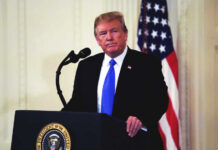
(TheRedAlertNews.com) – BREAKING NEWS ALERT: Absent something that no veteran watcher of the United States Supreme Court spotted during today’s oral arguments before the court former President Donald J. Trump will win big when the court hands down its decision in the case where Colorado acted to remove Trump from the presidential election ballot in that state because it ruled that Trump is an insurrectionist and therefore ineligible to run for President of the United States.
Specifically, just a short while ago a predominant portion of the United States Supreme Court’s nine justices exhibited a strong inclination to overturn a decision made by the Colorado Supreme Court.
This decision had previously prohibited former President Donald Trump from appearing on Colorado’s Republican presidential primary ballot.
Trump, alongside his legal representatives, contested the December 19 verdict from Colorado’s highest court, which had declared him ineligible for the March 5 GOP primary. This ruling was based on allegations of Trump violating the Constitution’s “Insurrection Clause” during the Capitol riot on January 6, 2021.
Trump’s defense posited several arguments: firstly, that the responsibility of enforcing this clause lies with Congress, not the states; secondly, that this provision does not pertain to the presidential office; and lastly, that the 45th president did not partake in an insurrection, despite the chaos caused by his supporters at the Capitol, which interrupted the official certification of Joe Biden’s 2020 electoral victory.
The argument emphasizing Congress’s exclusive right to enforce the clause resonated most with the Supreme Court, particularly with Chief Justice John Roberts. During oral arguments, Roberts expressed concern that affirming Colorado’s decision could lead to a dangerous precedent where states, motivated by partisan biases, could arbitrarily disqualify opposing political figures from ballots.
Roberts highlighted a significant potential repercussion: “It’ll come down to just a handful of states that are going to decide the presidential election. That’s a pretty daunting consequence.”
In defense of the voters seeking Trump’s removal from the ballot, attorney Jason Murray encountered skepticism from the justices. When Justice Elena Kagan, a liberal member of the court, questioned the rationale behind allowing a single state to influence presidential eligibility, Murray faced a pivotal challenge in his argument.
Conservative Justice Samuel Alito introduced a theoretical scenario to Murray, questioning whether a state could exclude a candidate based on diplomatic decisions that could be perceived as providing aid to a nation antagonistic towards the United States, indirectly referencing past policies towards Iran under the Obama-Biden administration.
Murray maintained that a state’s power to disqualify a candidate for treason must adhere strictly to the Constitution’s explicit definition of treason, advocating for trust in the electoral system’s integrity and the judiciary’s role as a safeguard against misuse.
The discussion extended to the specifics of the Fourteenth Amendment’s Section 3, which prohibits any person who has participated in an insurrection or rebellion against the United States, or provided aid to its enemies, from holding office. This section also notes Congress’s authority to lift such restrictions, a point underscored by recent legislative efforts by some of Trump’s allies to assert his non-insurrectionist status, an aspect that did not significantly influence the justices’ deliberations.
The only justice seemingly sympathetic to Colorado’s stance was liberal Sonia Sotomayor who questioned Trump’s attorney about potential implications for constitutional limits on presidential terms.
The discourse throughout this legal examination not only underscored the complexities of constitutional interpretation but also highlighted the intricate balance between state and federal powers in determining eligibility for presidential candidacy.














